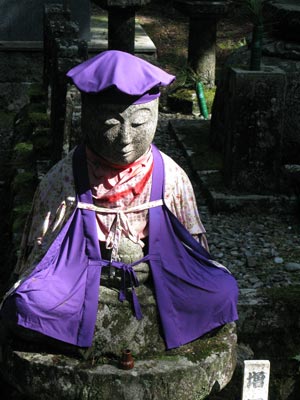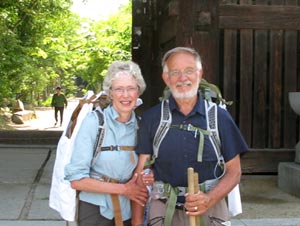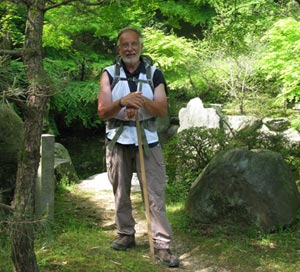 |
| The Marches encountered hundreds of these statues along the way. This one looks out for the souls of children who have died before their parents. |
For more than a thousand years, Buddhist pilgrims have embarked on the Shikoku pilgrimage ā a grueling expedition to 88 temples on Japanās fourth largest of Shikoku, meant to honor an ancient Buddhist saint. In 2010, Dalhousieās Sunny Marche joined their ranks.
Dr. Marche, acting dean of Dalās Faculty of Graduate Studies, first began to study Buddhist philosophy 30 years ago. Those readings, along with a series of articles on the Shikoku pilgrimage and The Art of Pilgrimage by Phil Cousineau, inspired his journey, undertaken during his 2010 sabbatical.
āYou start to read and, jeez -- thatās why you have to keep your children from reading,ā he jokes. āThe whole question of motivation around pilgrimage is really a complicated oneā¦ reflective practice is an important part of personal renewalā¦ reading is not nearly the same as direct engagement.ā
Along for the ride was his wife Janet Marche. Did she share his fascination with Buddhism?
āShe appreciates the moral dimension but has less of a spiritual connectionā¦ she was willing to help me out in the adventure,ā Dr. Marche says. More to the point, āSheās not interested in letting a 60-year-old man wander off on his own into a foreign country.ā
 |
| Janet and Sunny Marche on the pilgrimage. |
Upon wandering off, together, into a foreign country, the Marches discovered the difference between reading about the path and walking it. āMy wife and I have done a fair amount of hiking in our time,ā he says. But the Marchesā longest hiking trip was six days ā the Shikoku Pilgrimage is 1,200 to 1,400 kilometres in length and may take two monthsā walking to complete. (Many of the faithful choose to undertake their journey by bus or car ā those who go by foot are relatively rare.) āThis is not a flat trail,ā Dr. Marche says. āItās on a volcanic island. There are six places designated by a Japanese word which means āthe place where the pilgrims fall down.ā They donāt just mean that literally; they mean it psychologically too.ā
The Marches almost āfell downā a week into their pilgrimage. āWe made a number of serious mistakes. We took Body Shop foot lotionā¦ if youāre going to walk 25 kilometres, you donāt want to have soft feet.ā It also began to rain heavily. āTo get up the next day, bandage your feet, put on your still-damp boots and walk another 25 kilometres in the rain is not an easy thing to do.ā
The combination of tender, blistered skin and rain caused Janetās foot to become infected, and the infection spread up her leg. But the Marches stuck it out. āWe were wise enough to have antibiotics with us, which she began taking.ā They took a day off walking due to the infection, briefly traveling by bus and train instead. āI had to give up my attachment to the goal of doing this pilgrimage entirely on foot,ā says Dr. Marche. He muses that the sacrifice of his lofty goal, as an application of the Buddhist ideal of giving up attachment, constitutes a perfect example of āembodied learning.ā
 |
| Sunny Marche: "We were immersed on the island of Shikoku in compassion." |
Beyond the trials of the open road, the Marches ran into the usual tourist frustrations, such as the language barrier. āYou canāt read signs, you canāt read newspapers.ā They also encountered cultural differences, as when they stayed at traditional Japanese inns.Ā āYou sleep on a futon on the floor and thereās no such thing as a chair in the whole place.ā But all pilgrims wear distinctive white clothing and carry walking sticks, and the people of Shikoku have a long-standing tradition of providing any aid they can to the faithful.
āWe were immersed, on the island of Shikoku, in compassion.ā
Dr. Marche, whose background is mostly in information systems, is quick to disclaim a right to formally āteachā about Buddhism ā or, since Buddhism is more a spiritual practice than a āreligion,ā even to call himself a Buddhist. āI think that that label is completely unhelpful.ā
Nevertheless, heās about to share stories of his Shikoku adventure with a Dalhousie audience and encourages everyone to attend, both those interested in travel and adventure and those with more spiritual leanings. āI think that everyone brings something different to the talk and takes away something different.ā
Dr. Marche presents "Finding the Path: Two Million Steps" on Thursday, October 7, 7:15 p.m., in Room 1020 of the Rowe Management Building.
